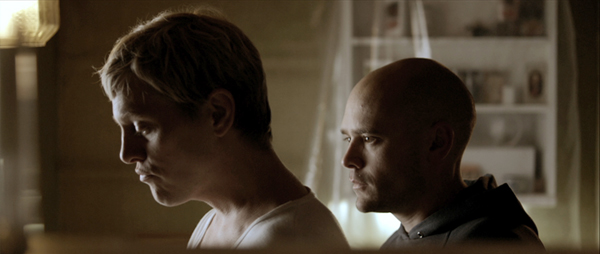|
Reviews of Recent Independent, Foreign, & Documentary Films in Theaters and DVD/Home Video

BROTHERHOOD In Danish writer/director Nicolo Donato’s hard-hitting debut film, Brotherhood, aka the gay neo-Nazis movie, the script moves right to the point. With little let-up, the specter of violence is only a bar fight or a glance away. The gay bashing in the opening scene foreshadows what’s to come; that’s followed by the humiliation of Sergeant Lars Kristofferson, whose promotion has been blocked because of unnamed allegations that he made drunken passes at more than one subordinate. Lars flat out denies the accusations, to which his supervisor responds, “How can you run a platoon if your men don’t respect you?” Gap-toothed and with heavy bags under his eyes, the blond Lars look like a choir boy after a bender. As the film speeds along, it suggests but never satisfactorily answers why someone as intelligent and eloquent (let alone possibly gay) as Lars would hang out with a bunch of white supremacists sipping beer under a Confederate flag. And why doesn’t he run out of the room when the party begins to discuss attacking the local refugee center? Lars even calls the guys losers to their faces. He may be xenophobic, but he’s no thug. The ex-sergeant later returns to the neo-Nazi’s beach party—the main activity, burning an effigy of an Arab woman—and within weeks, he’s offered party membership. His betrayal and rejection by the army throws him into another masculine arena with an authority figure doling out approval sparingly. It also presents an opportunity for Lars to rebel against his controlling, rising politico mother. As if to intentionally antagonize her, he casually confesses to her that he attacked an Iraqi refugee mentioned in the newspaper. To which, she replies, “There’s not an ounce of man in you.” Ouch. (His father hardly says two sentences.) Having stormed out of his well-to-do parents’ home with nowhere else to go, Lars knocks on the door of the group’s leader, who assigns him to live with the second-in-command, skinhead Jimmy (David Dencik), in the remote, fixer-upper beach house owned by the party chairman, where Jimmy is to supervise the indoctrination of the new recruit. Jimmy, by the looks of it, is a model member, with a tattooed Iron Cross on his tight abs and a swastika on his back. Not enough of Lars’s life is depicted to fill in the gaps regarding why he has chosen ignorance and voluntarily entered into a strictly proscribed and über-masculine subculture. There, all it takes to goad someone into action is a little gay-baiting. Perhaps Donato is more focused on exploring male identity than on Lars’s backstory, but it becomes one more hot issue on an overflowing plate. The director bravely risks centering his film on two protagonists whom most audiences would find repellent, but a skinny-dipping scene immediately changes the severe tone. The tensest moment occurs afterwards when each man returns to his bedroom, leaving the door open, waiting for some sort of signal from the other. As to be expected from two extreme right-wingers, the film contains an excruciatingly awkward morning-after scene. The men wake up and find themselves in bed together, naked and both terrified of the consequences. It’s not lost on Lars or Jimmy that their relationship contradicts their group’s philosophy, “to live in harmony with nature’s laws.” Although
playing a walking case of pop psychology, actor Thure Lindhardt, as
Lars, delivers an equally external and internal performance. However, I
didn’t quite believe the redemptive potential for the hotheaded Jimmy
that the film insists on. A subplot in which
he tenderly takes care of his junkie brother (the film does pile on the
issues) hardly softens or balances the violent behavior we witness from
Jimmy. An embrace or caress has less visceral impact than a kick to the
stomach.
Kent Turner
|

